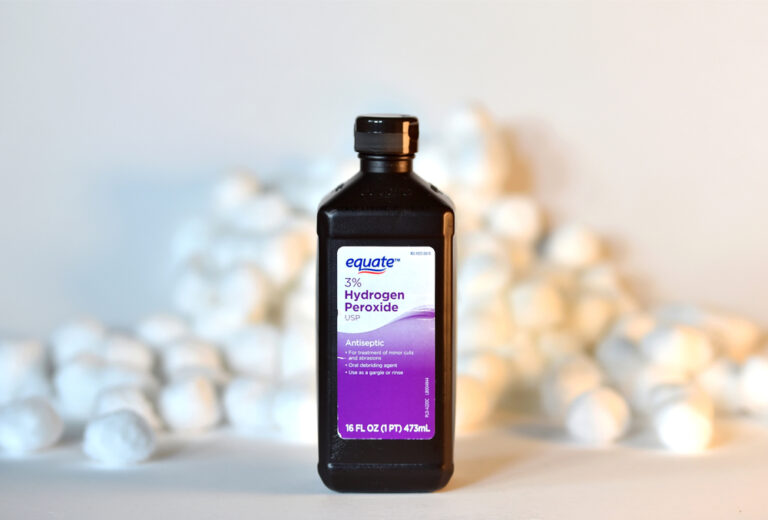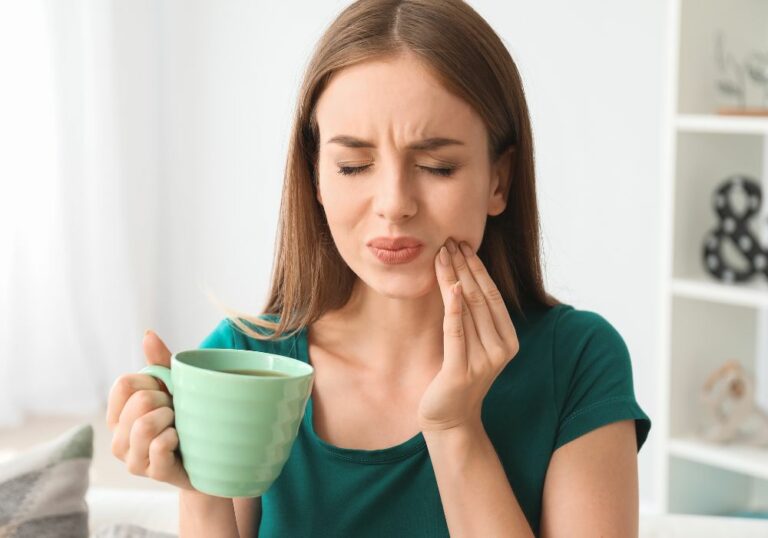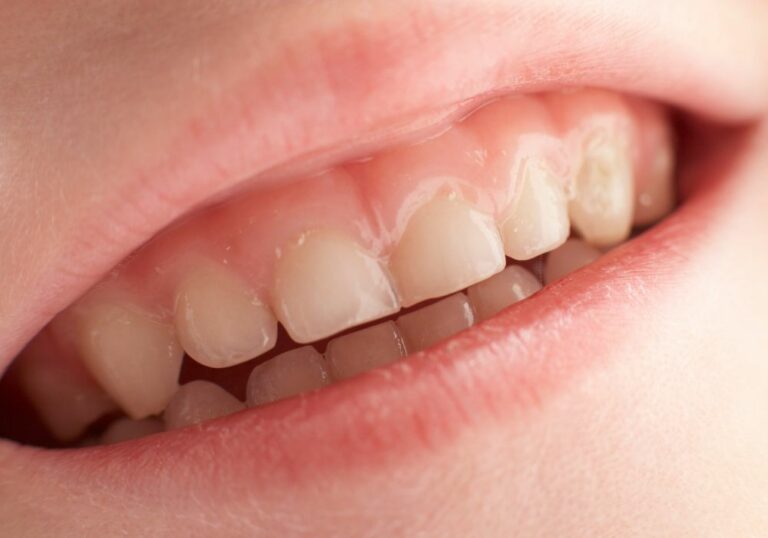Activated charcoal has become a popular natural remedy for teeth whitening. Proponents claim that activated charcoal can absorb stains and help remove discoloration from teeth. But does activated charcoal actually work to whiten teeth? Here’s a comprehensive look at the evidence behind using activated charcoal for teeth whitening.
What causes teeth to become yellowed or stained?
Teeth can become discolored over time due to both intrinsic and extrinsic factors. Understanding what leads to tooth stains and yellowing can help determine effective whitening solutions.
Intrinsic tooth stains
Intrinsic tooth stains occur within the inner structure of the tooth, underneath the enamel surface. Several factors can contribute to intrinsic discoloration:
- As teeth naturally age, the enamel can become thinner and more translucent. This allows the yellowish dentin underneath to show through more noticeably, causing teeth to darken and appear more yellow.
- Trauma to the mouth and teeth can damage the tooth structure and lead to internal discoloration over time. Cracks or chips in the enamel allow stains to penetrate deeper.
- Excessive exposure to fluoride during tooth development as a child can incorporate into enamel crystallization and cause intrinsic white spots or staining. Fluorosis is an example of intrinsic fluoride staining.
- Certain medications taken while teeth are developing may incorporate into the tooth structure and cause discoloration. Tetracycline antibiotics are a common medication leading to intrinsic grayish-brown banding or spots on teeth.
- Dental restorations with metal compounds like mercury or silver can corrode over time and leach into the tooth structure, leading to intrinsic dark grey, black or greenish discoloration along the gum line.
Extrinsic tooth stains
Extrinsic stains occur on the outer enamel surface of teeth from pigments and compounds that bind to the enamel. Frequent exposure to certain foods, drinks, medications, or products can promote extrinsic staining:
- Coffee, tea, red wine, berries and other foods: Plant-based pigments like tannins can adhere to enamel and cause brownish extrinsic stains.
- Tobacco use: Tar and nicotine lead to yellowish to brown extrinsic stains on teeth. Pipe smoking can cause black extrinsic stains.
- Poor oral hygiene: Plaque buildup on the teeth leads to bacterial stains and tartar that contribute to yellowing.
- Chlorhexidine mouthwash overuse: The antimicrobial mouthwash can cause extrinsic brown staining on teeth.
- Metallic compounds in medications or supplements: Iron supplements, bismuth medications, or colloidal silver can cause greyish and black extrinsic stains on enamel.
Factors that influence tooth staining
Some people are more predisposed to extrinsic staining than others. Factors that affect staining susceptibility include:
- Tooth enamel thickness and porosity: Thinner or more porous enamel allows extrinsic stains to penetrate deeper and cause more discoloration.
- Genetics: Some people may be more intrinsically prone to tooth discoloration.
- Medications: Antibiotics, antihistamines, and blood pressure medications promote extrinsic staining.
- Dry mouth: Reduced saliva flow allows more stain buildup on the teeth.
- Gum recession: With more root surface exposed, stains can penetrate deeper into dentin material.
- Age: As enamel wears down over time, teeth become more vulnerable to extrinsic stains.
How does activated charcoal whitening work?
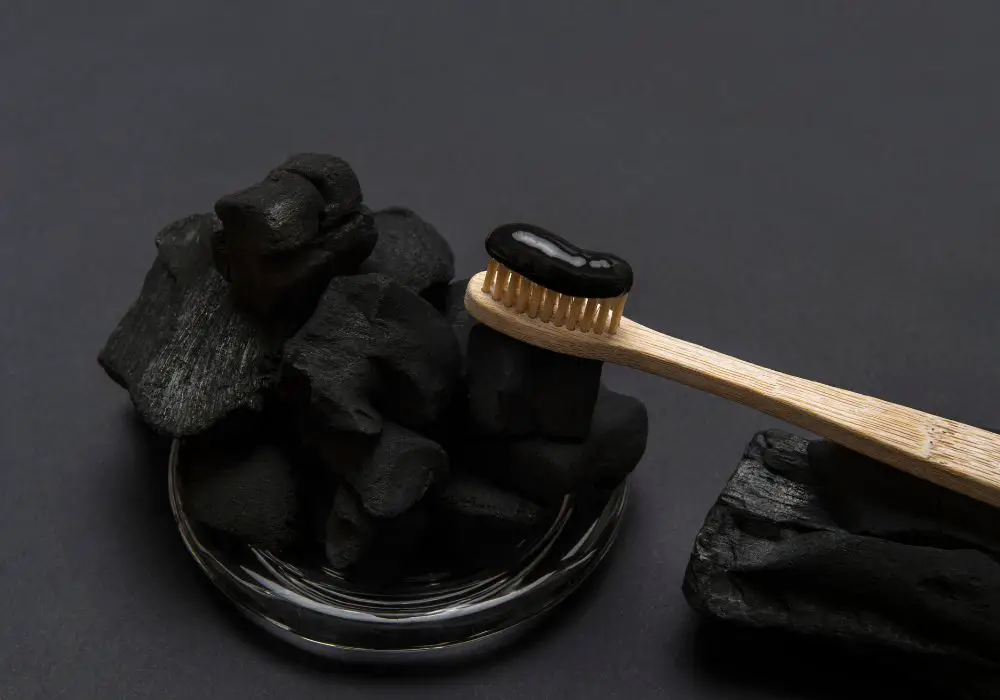
Activated charcoal has been utilized for medical purposes for centuries. More recently, it has become a popular ingredient in over-the-counter tooth whitening products. Here’s an overview of how activated charcoal is thought to brighten stained teeth:
What is activated charcoal?
Activated charcoal is a highly porous, fine black powder made from materials such as coconut shells, coal, wood, or petroleum. The charcoal goes through a heating process to increase its absorption capacity. Activated charcoal has an extremely large surface area, making it effective for binding to chemicals and removing toxins. This ability to “adsorb” compounds has led to its use for poison treatment and other medical detoxification purposes.
Proposed mechanisms for whitening teeth
When activated charcoal is used in toothpaste or other oral products, it may help remove stains by:
- Adsorbing stain particles – The porous charcoal may theoretically adsorb small extrinsic stain compounds on the enamel surface. By essentially trapping pigment particles in its pores, charcoal could help lift some external stains.
- Mechanical removal – Charcoal is somewhat abrasive, so it may provide a mechanical scrubbing effect to buff off extrinsic stains on the outermost enamel layer.
However, activated charcoal is unlikely to penetrate into the tooth’s deeper layers. It probably does not change the intrinsic tooth color from the inner structure. Activated charcoal may only remove superficial extrinsic stains from the enamel, not inner intrinsic stains.
Does activated charcoal damage enamel?
While limited evidence suggests activated charcoal may remove some surface stains, there are also risks it may be too abrasive for enamel.
Concerns with abrasiveness
In order for activated charcoal to mechanically scrub off stains, it must have an abrasive texture. Charcoal toothpaste contains mildly abrasive particles like charcoal powder along with silica to help buff away stains on enamel. But it’s this abrasiveness that raises concerns among dentists.
Overly abrasive whitening toothpastes could permanently damage enamel over time with frequent use. As the outer enamel layer gets worn down, teeth can become increasingly sensitive and prone to cavities. Dentists warn that improper or overuse of charcoal could irreversibly weaken and erode enamel.
Activated charcoal is considered a moderately abrasive ingredient for toothpastes. This means there could be risks associated with using activated charcoal whitening products daily long-term without professional guidance. More research is still needed on finding the proper charcoal concentration and particle size to balance effectiveness and abrasiveness.
Existing research on enamel effects
Only a handful of studies have looked at how activated charcoal affects enamel with in vitro testing:
- A 2016 study found charcoal powder alone had a similar abrasiveness to commercial whitening toothpastes. Addingcharcoal to toothpaste increased abrasiveness.
- A 2017 study showed activated charcoal dentifrice did not cause significant enamel surface roughness compared to fluoride paste after 4 weeks use.
- A 2018 study found activated charcoal powder had a mildly abrasive effect on enamel, but was likely safe for occasional use with control.
- A 2021 review concluded current in vitro studies do not show evidence of enamel damage from short-term charcoal toothpaste use. But the need for more clinical trials on long-term abrasion effects was noted.
So while limited research to date does not demonstrate serious enamel damage from short-term charcoal use, dentists still generally recommend caution until more controlled human trials are conducted looking at effects after months or years of daily activated charcoal use on teeth.
Does activated charcoal effectively whiten teeth?
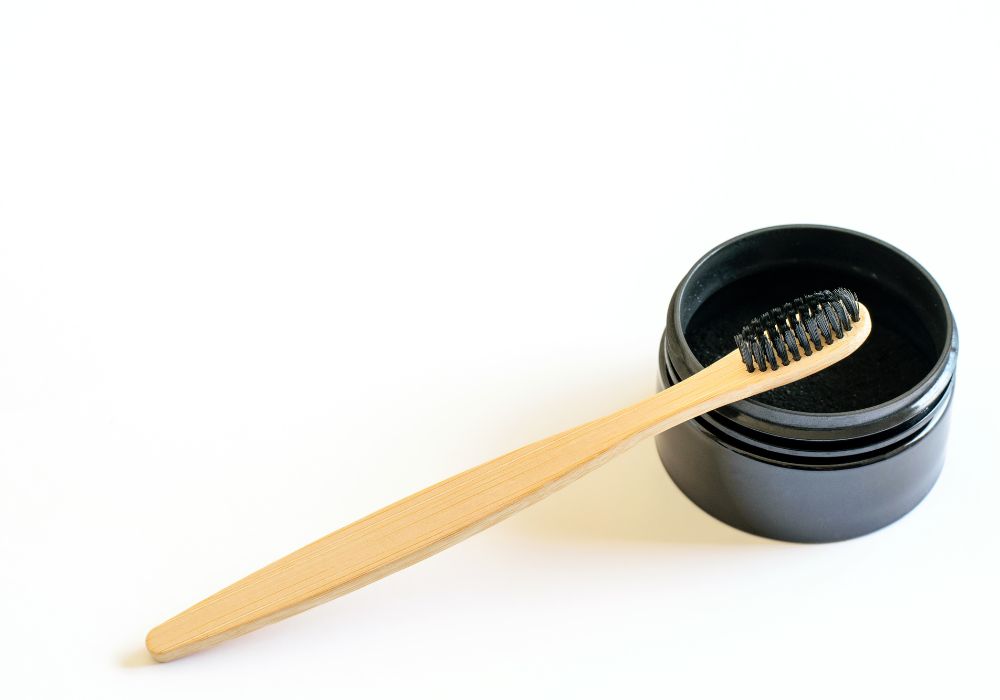
Despite the popularity of activated charcoal for DIY teeth whitening, only a handful of clinical studies have evaluated charcoal’s true effectiveness at brightening stained teeth. More rigorous research is still needed.
Small scale clinical studies
Some small clinical studies have found limited surface stain removal from using activated charcoal dentifrice:
- A 2017 study of 18 subjects observed slightly less visible stains on crowns after using activated charcoal toothpaste compared to regular fluoride toothpaste over 6 weeks. But no significant difference was seen in stain removal for natural teeth between the toothpastes.
- A 2019 study of 18 patients found that using a charcoal toothpaste twice per day for 4 weeks resulted in modestly whiter teeth based on digital image analysis.
- A 2021 study on 117 teenagers observed some extrinsic stain removal after using a charcoal dentifrice for 6 weeks compared to a silica toothpaste. But the average improvement was only about 1 shade measured with a dental shade guide.
- A 2022 study on 50 medical students found no significant difference in tooth color change between charcoal and fluoride toothpastes after 4 weeks use.
Overall, the clinical whitening benefits shown in studies so far appear small, gradual, and predominantly limited to superficial extrinsic stains. More controlled clinical research is still needed to clarify activated charcoal’s efficacy and safety for whiting teeth long-term.
Potential downsides
Some downsides to using activated charcoal powder for teeth whitening include:
- Limited whitening power – Evidence shows activated charcoal only removes light surface extrinsic stains, not intrinsic or deep stains.
- Stain recurrence – Whitening benefits are temporary as stains build up again quickly without changing intrinsic color.
- Abrasion risks – Enamel erosion is a concern with frequent use or improper application.
- Messiness – Charcoal powder can be difficult to apply and adequately rinse off. Pre-mixed pastes are likely safer and neater.
Professional whitening remains most effective
While some activated charcoal products may provide a minor degree of surface stain removal, the highest level of whitening with the deepest and longest-lasting results will be achieved through professional teeth whitening treatments.
Professional in-office or take-home whitening overseen by your dentist allows customization of the whitening agent concentration and application based on your specific type and degree of discoloration. With stronger concentrations of hydrogen or carbamide peroxide that penetrate beneath the enamel, professional whitening can alter the intrinsic tooth color for dramatically whiter teeth compared to over-the-counter methods like charcoal.
Potential side effects of charcoal teeth whitening
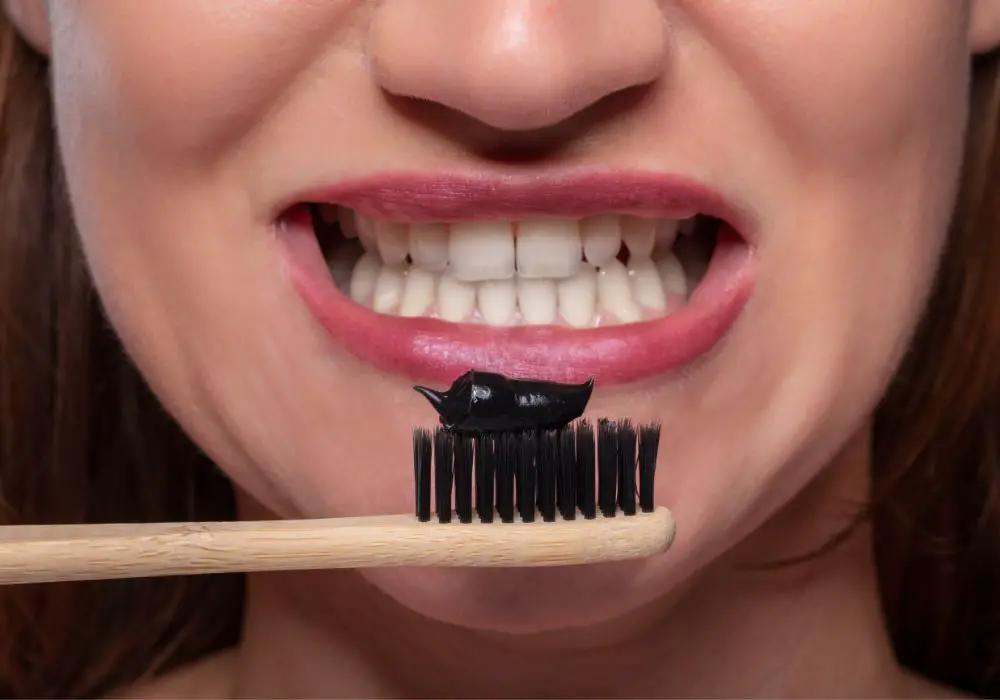
Along with uncertainties about enamel abrasion and whitening effectiveness, using activated charcoal oral products also carries some other possible adverse side effects:
Black stools
Charcoal powder that is ingested or swallowed can cause temporary blackening of stools which can be concerning but is harmless. Always thoroughly rinse the mouth after using charcoal toothpaste to minimize ingestion.
Choking hazard
The fine powdered charcoal poses a choking risk if inhaled for those with swallowing difficulties or in children. Supervise child use of charcoal toothpaste. Tablet or capsule forms may be safer than loose powder.
Allergic reactions
Some people may be allergic or sensitive to charcoal with symptoms like rash, swelling, or irritation. Discontinue use if any reaction occurs.
Gum and mouth irritation
The gritty texture of charcoal may irritate gums, lips and the soft tissues of the mouth, especially with overuse or harsh brushing.
Medication interactions
Charcoal can adsorb medications in the gastrointestinal tract, preventing proper absorption if taken at the same time. Separate charcoal toothpaste use and oral medication dosing by 2 hours.
Consult your dentist before trying any activated charcoal oral products to discuss your risks and benefits. Proper application and moderation is key to prevent complications.
Safer charcoal-free alternatives for stain removal
If you have concerns about using activated charcoal but want to remove some surface stains from teeth, some gentler natural alternatives to try include:
Baking soda
Baking soda provides a mild abrasive effect to scrub away extrinsic stains without being too harsh on enamel. Make a paste with water and gently rub on teeth 1-2 times per week, rinsing thoroughly after.
Strawberries
Strawberries contain vitamin C, malic acid, and other natural compounds that can help lift surface discoloration on teeth. Mash some ripe strawberries and gently rub on teeth for 1-2 minutes, then rinse. The effect is temporary but can brighten your smile a shade or two.
Hydrogen peroxide
As a bleaching agent, hydrogen peroxide may lift some external stains from enamel. Dilute hydrogen peroxide 50/50 with water and swish around the mouth for 1 minute, then rinse. Use no more than 1-2 times per week.
Apple cider vinegar
The acetic acid in apple cider vinegar provides a gentle natural whitening effect. Mix 2 tablespoons ACV with 6 ounces water. Swish for 30 seconds then rinse your mouth. Use sparingly, as vinegar is highly acidic.
These non-abrasive home remedies likely provide only minor cosmetic brightening of surface stains, but are safer for your enamel than frequent use of charcoal.
Lifestyle habits for avoiding teeth stains
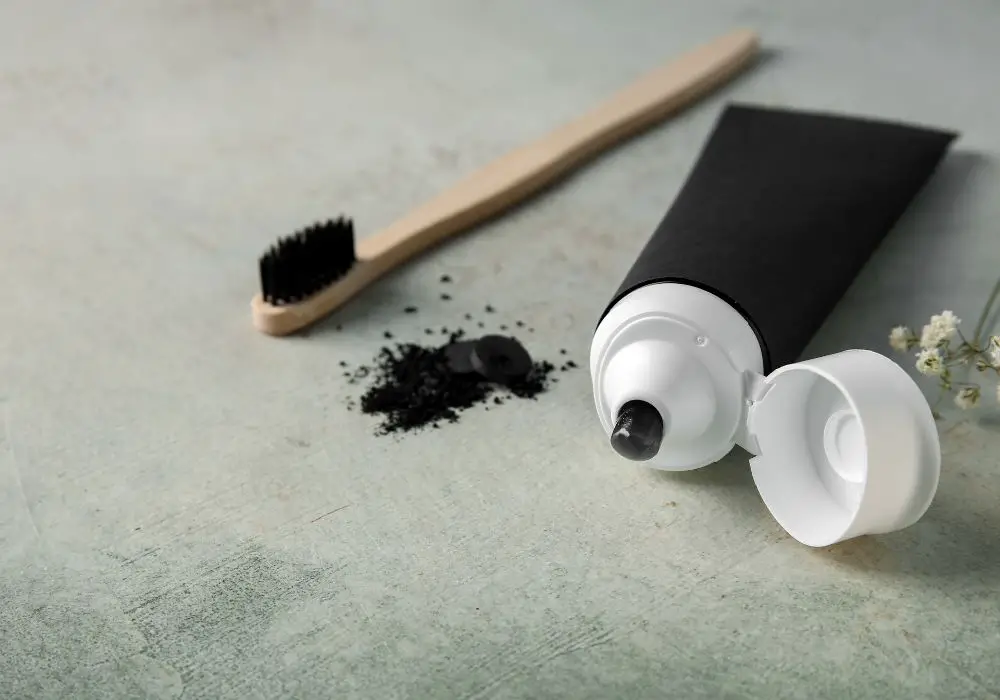
In addition to periodic use of natural whiteners, developing good daily habits can help minimize and prevent stains on your teeth:
- Brush thoroughly twice daily with a soft-bristled toothbrush and fluoride toothpaste. Regular brushing prevents plaque buildup that leads to stains.
- Floss daily to clear away stain-causing plaque between teeth and along the gum line.
- Swish with water after consuming staining foods or drinks to wash away pigments left behind.
- Drink dark staining beverages like coffee, tea, and wine through a straw to minimize contact with front teeth.
- Quit tobacco smoking or chewing to prevent accumulation of tobacco stains.
- Get professional cleanings every 6 months to clear away hardened tartar and stains on teeth.
Avoiding smoking and limiting intake of staining foods and drinks can help keep teeth whiter between professional whitening treatments. Proper daily oral hygiene minimizes new stains from adhering to enamel.
Conclusion
Activated charcoal has surged in popularity as a trendy natural teeth whitening solution. However, there is still limited robust clinical evidence on its long-term safety and efficacy for stain removal. While some early research shows minor superficial extrinsic stain reduction, activated charcoal cannot deeply whiten intrinsically stained teeth. More controlled human studies are needed to verify benefits outweigh risks with prolonged use.
Professional whitening overseen by your dentist remains the most effective way to dramatically brighten teeth, lighten intrinsic discoloration, and achieve customized whitening results. For those concerned about abrasiveness or messiness of charcoal, gentler natural whiteners like baking soda or diluted hydrogen peroxide can provide temporary stain removal without stripping enamel. Along with periodic professional whitening procedures, developing daily habits to prevent new stains may help maintain a bright, beautiful smile with good oral health.
Frequently Asked Questions
Q: How often can I use activated charcoal toothpaste?
A: Activated charcoal toothpaste should be used no more than once daily, and not every day for prolonged periods. Using charcoal toothpaste more frequently increases the risks of it being too abrasive on enamel. It should also be alternated with regular fluoride toothpaste for cavity protection.
Q: Does activated charcoal whiten teeth permanently?
A: No, activated charcoal does not permanently whiten teeth. Any whitening effects are temporary as charcoal is only removing light surface stains. For permanent whitening of intrinsically stained teeth, professional whitening treatments are required.
Q: Can I just use charcoal powder on my teeth?
A: It’s not recommended to use plain activated charcoal powder directly on teeth. Formulated charcoal toothpastes contain additional ingredients for safety and brushing ease. Charcoal powder on its own could potentially be overly abrasive if applied too vigorously.
Q: Can kids use activated charcoal toothpaste?
A: Activated charcoal toothpaste is generally not recommended for children under age 12. The impacts on developing enamel are unclear. Plus charcoal poses choking risks for younger children. Parents should consult their pediatric dentist before using activated charcoal products on kids.
Q: Does activated charcoal damage dental work?
A: Activated charcoal should not damage or stain most dental fillings, crowns, implants or other dental work. But cautions about enamel abrasion would still apply for any existing natural tooth structure. Those with extensive dental work should likely limit charcoal use.


